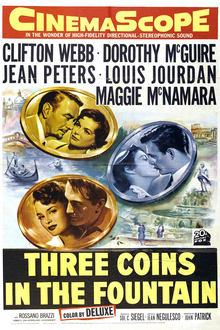Plot
Young American secretary Maria Williams arrives in Rome, greeted by Anita Hutchins, who she is replacing at the United States Distribution Agency. They drive to the Villa Eden, which Anita shares with Frances, the longtime secretary of American author John Frederick Shadwell, an expatriate living in Rome. On their way, they stop at the Trevi Fountain, where Maria learns the legend that throwing a coin in the fountain while wishing to return to Rome will make the wish come true. Maria and Frances throw in their coins; Anita, returning to the US, declines.
At the agency, Anita introduces Maria to Giorgio Bianchi, a translator. When Maria comments on Giorgio's attractiveness, Anita informs Maria that the agency forbids fraternization between American secretaries and Italian employees. At a party that evening, Maria becomes smitten with the handsome Prince Dino di Cessi, despite being warned of his reputation as a womanizer, notorious for taking women to Venice for romantic trysts. Dino charms Maria.
Noting Maria's interest in Dino, Anita confesses to Maria that she is leaving because she has a better chance of finding a husband in the US. She warns Maria that wealthy Italian men are not interested in mere secretaries, and men who are interested are too poor. Later, they encounter Giorgio, who invites Anita to attend a celebration with him at his family's country farm the next day. Anita reluctantly agrees.
As Giorgio picks Anita up in his cousin's dilapidated truck, they are spotted by her boss, Burgoyne. Giorgio, who mentions having thrown a coin in the Trevi Fountain on first arriving in Rome, tells Anita that he is studying to become a lawyer. Giving in to mutual attraction, they kiss. Meanwhile, Dino asks Maria to accompany him to Venice. Desiring to see Venice but wary of damage to her reputation, Maria arranges for Frances to chaperone them—to Dino's disappointment.
At the agency, Burgoyne questions Maria about Anita's weekend with Giorgio. Although Maria maintains that Anita did nothing wrong, Burgoyne fires Giorgio. Blaming Maria for betraying her trust, Anita moves out of their apartment. She visits Giorgio, worried that she might have ruined his chances of becoming a lawyer. Giorgio has no regrets.
Determined to attract Dino, Maria collects information about his interests and preferences, including his love of modern art and his favorite food and wine. She lies about being "three-quarters Italian". Beguiled by how much they have in common, Dino introduces Maria to his mother, the Principessa, who approves. Dino confides to Maria that his mother is the only other woman whom he has ever completely trusted; conscience-stricken, Maria confesses her subterfuge. He angrily takes her home.
Anita admits to Frances that she and Giorgio are in love but will not marry because he is too poor. Comforting the dispirited Maria at home, Frances learns that Maria also plans to leave Rome because Dino continues to stay away. Frances then announces to Shadwell that she is returning to the US to avoid ending up an old maid in a foreign country. Unaware that Frances has been in love with him for 15 years, Shadwell offers her a marriage of convenience based on mutual respect, which she accepts.
During a physical exam the next day, Shadwell learns he is terminally ill with less than a year to live unless he goes to the US for experimental treatment. He ends his engagement to Frances. After learning about Shadwell's condition from his doctor, Frances follows him to a café, where they drown their sorrows while bickering about whether he should pursue treatment. Realizing Frances's attachment to him, Shadwell visits Dino and informs him that he is leaving for the US, where he will marry Frances. Shadwell uses reverse psychology to convince Dino that he loves Maria.
As Anita and Maria are packed and ready to leave, Frances telephones, asking them to meet at the Trevi Fountain. There, Maria and Anita are disappointed to see the fountain emptied for cleaning. When they are joined by Frances, however, the water springs up again, prophetically, as Dino and Giorgio arrive in turn. As the men embrace their respective women, Shadwell joins Frances, and they all happily admire the fountain.
